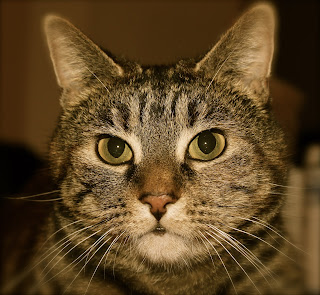Does having a stable, happy home make for a more territorially confident domestic cat?
First of all we should correct a technical misconception in the title. Cats have never actually been succesfully bred for domsetication, like for example dogs have. At least not to the same degree. They won't allow it. Cats decided long ago that they dont care what humans think about them. They decide when they want to sit on your lap and when they want to scratch the shit out of your sofa.
However the question I want to ask is, do happy cats make more territorially dominant cats? In other words, if you have created a loving, stress free home for your cat and you supply them with plenty of sirloin steak leftovers will they strut around your garden, pissing on everything and slapping around the neighbour's cat, letting him know who's really the boss? Or is the opposite true even. Are "comfortable" or privileged cats less aggressive and more recessive in nature?
In a city and urban environment you're inevitably going to have aggression between cats. They will end up on each others turf causing them to arch their backs and puff up their tails as if they've just been hit with a taser gun by a trigger happy police officer in suburban Detroit.
Our two cats, brother and sister, grew bored of each other after about 1 year and then started exploring their surroundings. Willem, the boy, ever shy and low on testicular fortitude took a few years to grow into his sexual maturity and build the courage to start challenging the bullies patrolling our small London garden. But once he did, he fully embraced his newly achieved status as the strutting Godfather of Maida Hill. He laid the law down for a few years, slapping around those who dared challenge his patch, possibly suggesting that a happy cat at home does indeed make for a more confident territorial cat outside.
On the flip side of that, we inadvertently adopted a poor little black cat that had clearly been abandoned by his owners. He would often gravitate into our garden and occasionally come in through the catalpa and help himself to some of the cat food. Our cats tolerated him. He was in desperate need of some love and care so we were happy for him to help himself to the food and we even got him checked and chipped at our vet. He was an extremely volatile little fellow, hissing at everything and everyone and getting into constant scraps with the other cats and hence we named him Moriarty.
Moriarty clearly did not have a stable, happy domestic home, and yet he was always challenging other cats. Having watched him over an extended period of time I noticed he was a very aggressive cat. However I wouldn't call him confident necessarily. It stemmed more from insecurity and a need to prove himself, not having a stable home base to retire to. If I compare that to Willem who, in his prime, only got into fights for his territory when absolutely necessary or challenged, dominating all other cats with real confidence it would suggest to me that a happy domestic cat with a stable home environment does indeed make for a more territorially confident cat.
I would love to know if an actual scientific study has ever been done on this.
Miauw.



Comments